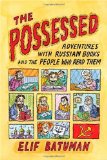Summary | Excerpt | Reviews | Beyond the Book | Readalikes | Genres & Themes | Author Bio

 Book Reviewed by:
Book Reviewed by:
Julie Wan
Buy This Book
The imperative to understand life and describe it provides an urgent, moving refrain in the 1920 diary.
“Describe the orderlies—the divisional chief of staff and the others—Cherkashin, Tarasov.”
“Describe Matyazh, Misha. Muzhiks, I want to penetrate their souls.”
Whenever Babel meets anyone, he has to fathom what he is. Always “what,” not “who.”
“What is Mikhail Karlovich?” “What is Zholnarkevich? A Pole? His feelings?”
“What are our soldiers?” “What are Cossacks?” “What is Bolshevism?”
“What is Kiperman? Describe his trousers.”
“Describe the work of a war correspondent, what is a war correspondent?” (At the time he wrote this sentence, Babel himself was technically a war correspondent.)
Sometimes he seems to beg the question, asking, of somebody called Vinokurov: “What is this gluttonous, pitiful, tall youth, with his soft voice, droopy soul, and sharp mind?”
“What is Grishchuk? Submissiveness, endless silence, boundless indolence. Fifty versts from home, hasn’t been home in six years, doesn’t run.”
“I go into the mill. What is a water mill? Describe.”
“Describe the forest.”
“Two emaciated horses, describe the horses.”
“Describe the air, the soldiers.”
“Describe the bazaar, baskets of cherries, the inside of the tavern.”
“Describe this unendurable rain.”
“Describe ‘rapid fire.’ ”
“Describe the wounded.”
“The intolerable desire to sleep—describe.”
“Absolutely must describe limping Gubanov, scourge of the regiment.”
“Describe Bakhturov, Ivan Ivanovich, and Petro.”
“The castle of Count Raciborski. A seventy-year-old man and his ninety-year-old mother. People say it was always just the two of them, that they’re crazy. Describe.”
Babel’s “describe” in his diaries shares a certain melancholy quality with Watson’s mention of those of Sherlock Holmes’s cases that do not appear in his annals: “the case of the Darlington substitution scandal,” the “singular affair of the aluminum crutch,” “the mystery of the Giant Rat of Sumatra . . . for which the world is not yet prepared.” All the stories that will never be told—all the writers who were not allowed to finish! It’s much more comforting to think that, in their way, the promises have already been executed—that perhaps Babel has already sufficiently described limping Gubanov, scourge of the regiment, and that the mystery of the Giant Rat of Sumatra is, after all, already the mystery of the Giant Rat of Sumatra. Babel does return to the Raciborskis in Red Cavalry: “A ninety-year-old countess and her son had lived in the castle. She had tormented him for not having given the dying clan any heirs, and—the muzhiks told me this—she used to beat him with the coachman’s whip.” But even with the Zolaesque note of hereditary vitiation, the Turgenevian kinkiness of the coachman’s whip, and the hinted Soviet rhetoric of a knightly Poland “gone berserk” (a phrase from Babel’s own propaganda work), the “description” is still just two sentences.
• • •
One of the most chilling relics to emerge from Babel’s KGB dossier was the pair of mug shots taken upon his arrest in 1939.
Photographed in profile, Babel gazes into the distance, chin raised, with an expression of pained resoluteness. Photographed face-on, however, he seems to be looking at something quite close to him. He seems to be looking at someone who he knows to be on the verge of committing a terrible action. Of these images, a German historian once observed: “Both show the writer without his glasses and with one black eye, medically speaking a monocle haematoma, evidence of the violence used against him.”
Excerpted from The Possessed by Elif Batuman.
Copyright © 2010 by Elif Batuman.
Published in 2010 by Farrar, Straus and Giroux.
All rights reserved. This work is protected under copyright laws and reproduction is strictly prohibited. Permission to reproduce the material in any manner or medium must be secured from the Publisher.





The Funeral Cryer by Wenyan Lu
Debut novelist Wenyan Lu brings us this witty yet profound story about one woman's midlife reawakening in contemporary rural China.
Your guide toexceptional books
BookBrowse seeks out and recommends the best in contemporary fiction and nonfiction—books that not only engage and entertain but also deepen our understanding of ourselves and the world around us.